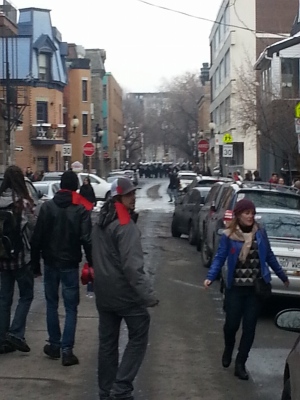Thousands of students and their supporters marched through downtown Montreal Tuesday afternoon, some pelting riot officers with snowballs to denounce the latest plans from the provincial government regarding university tuition.
There were some tense moments as students clashed with police on downtown streets, but overall the protest was less violent than many of those that dominated headlines last spring. Snow, ice, rocks and paintballs were thrown at officers, who responded by charging students, using stun grenades. Police said 13 people were arrested.
Several journalists were roughed up, including a CTV cameraman who was hit by a police billyclub.
The protest rally was organized by the student coalition ASSE, the core group that organized last year's student boycott movement and countless marches throughout Montreal.
Tuesday's action began with a rally and speeches from ASSE co-spokesperson Jeremie Bedard-Wien, Quebec Solidaire leader Francoise David, and others who said they think this week's Higher Education summit had the wrong focus.
Bedard-Wien said the protesters will fight not only the annual 3 per cent hike to university tuition, but will continue to fight for free university tuition for all Quebecers, something ASSE believes is entirely reasonable and affordable.
When student protests began last year the then-Liberal government was proposing a tuition hike of $1,625 over five years. Upon being elected, Premier Pauline Marois declared the proposed hike null and void, and this week announced university tuition would face annual 3 per cent hikes, an amount equal to about $70 per year, or $350 over the first five years.
CTV reporter Cindy Sherwin said the initial rally felt almost like a reunion, with many students wearing red facepaint and red felt squares, and carrying signs with anti-government slogans.
Montreal police blocked off traffic around Victoria Square, and declared the protest illegal before it began, saying protest organizers had refused to obey muncipal bylaw P-6 and inform police of the protest route.
Around 2:45 p.m. the protesters began their march, heading north up Beaver Hall Hill and turning west on Rene Levesque Blvd. before snaking through the downtown streets taking a route familiar to the marches last spring.
Several downtown bus routes were affected by the demonstration.
On Monday, a smaller group of protesters marched through downtown Montreal in a largely peaceful protest -- until it descended into violence. Some protesters hurled snowballs and paint-filled ping pong balls at police officers.
Police then used pepper spray on the crowd and eventually arrested two people for armed assault.
Higher Education Minister said on Tuesday that he expected there would be more protests after the government announced tuition would no longer be frozen.
"The protest today is normal, but a protest is not a crisis," said Pierre Duchesne.
Bedard-Wien said ASSE will examine several tactics to put pressure on the government, but expects a large-scale student boycott will not be repeated.
In the past month several CEGEP associations that were fervent supporters of last year's boycott held votes where they decided not to join Tuesday's one-day protest.
However a student group calling itself Mouvement Etudiant told Sherwin it is calling for nightly protests in Montreal, beginning on March 5, 2013.
Even the more moderate student groups, who did not boycott the summit, called the three-per-cent annual increases unacceptable.
They had been requesting an absolute freeze on tuition.
Instead, they got what some of them called a perpetual tuition hike.
"We're really disappointed about the fact the tuition fees are going up," said Martine Desjardins, president of Quebec's largest student federation, FEUQ, who attended the summit.
She said she had hoped the government would have debated the issue further.
But students, Desjardins added, did not leave the summit empty-handed. She credited the government with providing some extra funds for the financial-aid program and establishing a committee to examine mandatory student fees.
Student leaders will now consult their members about the next step.
It's not yet clear how many student groups, and protesters, will participate in the demonstrations set to begin next week, but there were thousands in the streets Tuesday.
Students weren't the only ones who disagreed with the government's plans for the education system.
Some university administrators left the long-awaited summit with deep concerns that their schools are at risk of years of under-funding, due to the government's plan to cut their budgets by $125 million in 2012-13 and again in 2013-14.
"The university system remains anaemic and it will be bled of $250 million in the coming years," Universite de Montreal rector Guy Breton told the summit.
Breton warned of a looming crisis that could imperil some university programs -- including medicine -- unless the government increases university funding.
"The patient is far from being in good health -- I guarantee that," he said.
Others saw the PQ government's indexed tuition increases as too small, a plan that would pile more burden on taxpayers who didn't go to university.
"You've obtained an artificial consensus... in this room where the vast majority is excluded," said interim Liberal leader Jean-Marc Fournier, who then pointed to the challenges of lower-earning Quebecers.
"When you ask (students) to pay a little less, someone else will pay instead."
Later in the day, some wags commenting on social media quipped that perhaps the Liberals would now take up the protest symbols like the red square and begin banging pots.
In an abrupt reversal of roles, it was the PQ government dealing with unrest in the streets.
One protester held up a sign that read: "Pauline, where's your casserole (pot)?"
As she closed the summit, Marois had said that when consensus cannot be reached, a government has a responsibility to act.
"That's what we decided to do," said Marois, who also credited the "frank" debate of the summit.
With a report from The Canadian Press







































